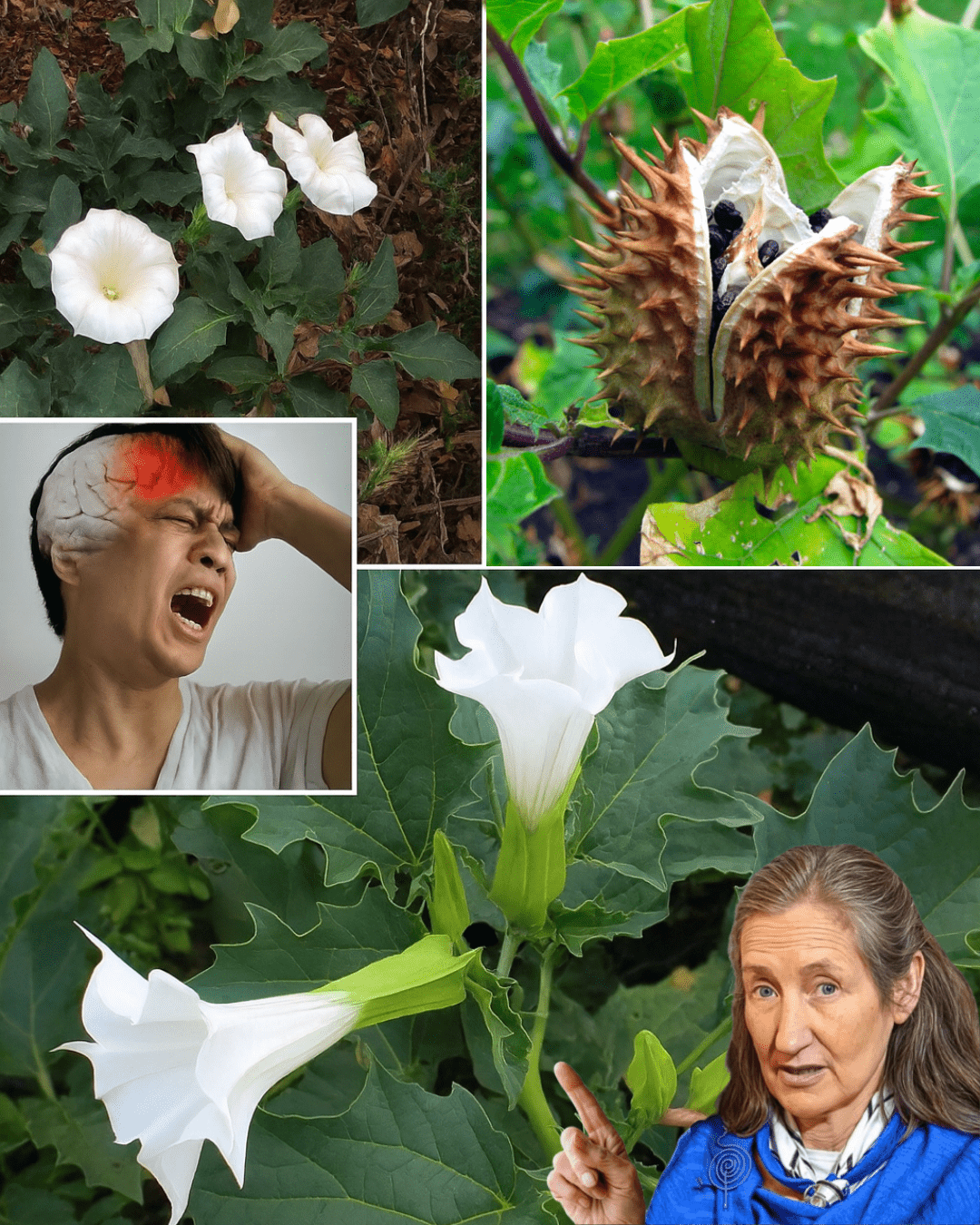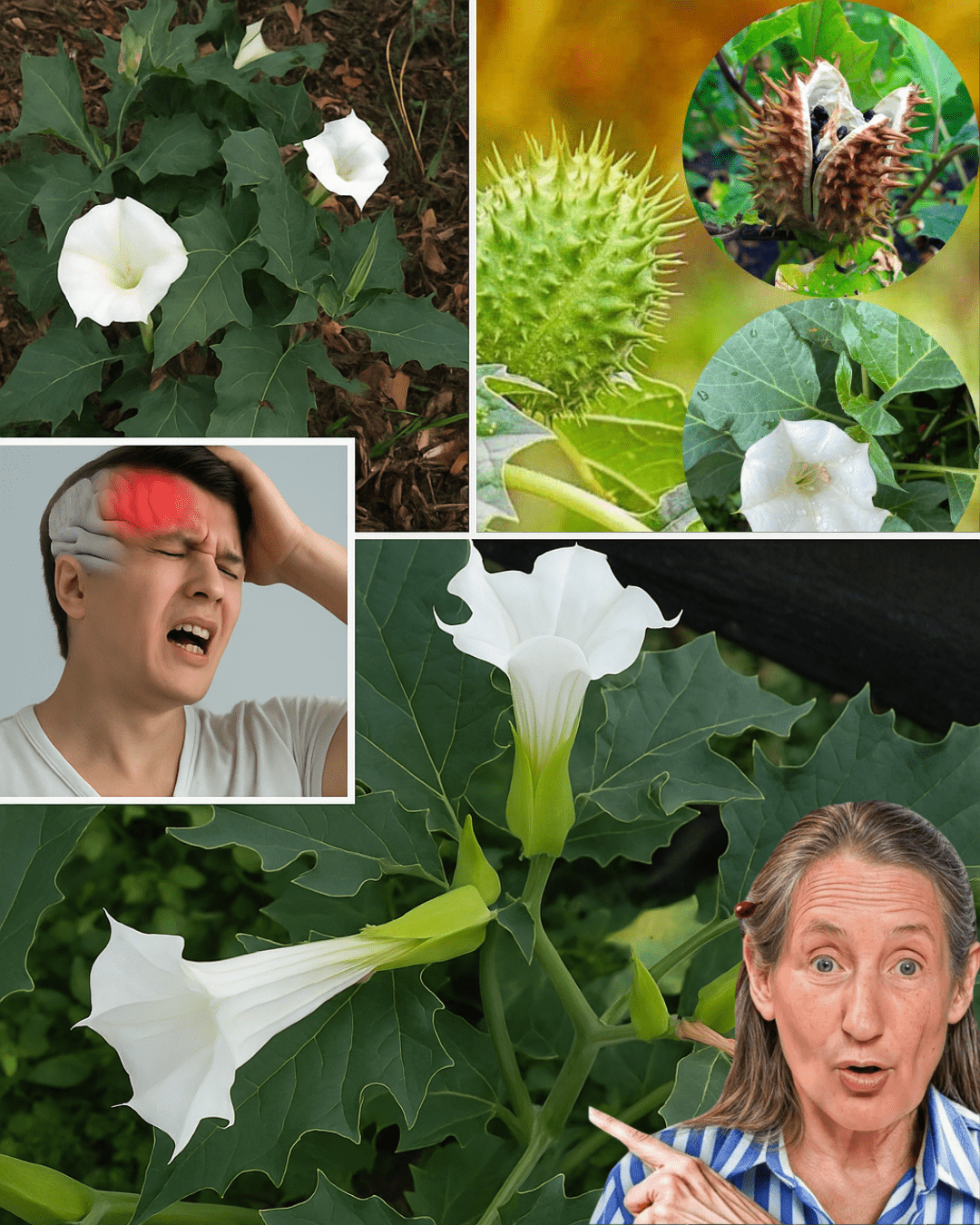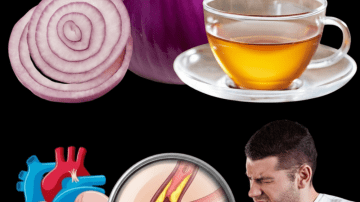Picture this: a stunning plant with trumpet-shaped flowers swaying in your garden, beckoning with its beauty. It looks harmless, even inviting, but beneath its charm lies a lethal secret. Meet Datura stramonium, a plant as dangerous as it is alluring. Known as jimsonweed or devil’s trumpet, this wild beauty thrives in backyards, roadsides, and forgotten corners across North America. For seniors who cherish gardening or foraging, its deceptive allure could pose a serious threat. Every leaf, flower, seed, and root harbors potent toxins that can turn a curious touch into a medical emergency. Dive into this guide to uncover the risks, recognize the signs of poisoning, and learn how to stay safe while enjoying your love for nature.

🌿 Why Datura Stramonium Is So Deceptively Dangerous
At first glance, Datura stramonium seems like a gardener’s dream. Its large, white or purple flowers and spiky seed pods add a dramatic flair to any landscape. But don’t be fooled—this plant is a member of the notorious nightshade family, alongside benign crops like tomatoes and deadly relatives like belladonna. Its beauty masks a toxic arsenal that makes it one of North America’s most hazardous plants, especially for older adults with underlying health conditions.
The danger lies in its unpredictability. Even a small encounter—brushing against a leaf or mistaking its seeds for something edible—can trigger severe reactions. For seniors, who may be on medications or have slower metabolisms, the risks are amplified. Understanding this plant’s dark side is crucial for anyone who spends time outdoors, whether tending a garden or exploring nature.
🧪 The Toxic Powerhouse: What Makes Datura Stramonium Lethal
The heart of Datura stramonium’s danger lies in its tropane alkaloids—atropine, scopolamine, and hyoscyamine. These potent chemicals disrupt the nervous system by blocking acetylcholine, a neurotransmitter critical for brain function, muscle movement, and heart regulation. The effects can range from uncomfortable to life-threatening, with symptoms appearing rapidly after exposure.
For seniors, these toxins are particularly risky. Even a tiny dose—a few seeds or a nibble of a leaf—can interact dangerously with medications for heart disease, diabetes, or other chronic conditions. The plant’s toxicity also varies with season, soil, and climate, making it impossible to predict a “safe” amount. This unpredictability underscores the need for caution around this deceptive plant.
🚨 Recognizing the Signs of Datura Stramonium Poisoning
Datura stramonium poisoning can strike quickly, with symptoms emerging within 30 to 60 minutes of exposure and lingering for up to 48 hours. Seniors, who may mistake these signs for other health issues, need to be especially vigilant. Here’s what to watch for:
- 🥵 Dry Mouth and Extreme Thirst: The plant’s anticholinergic effects halt saliva and sweat production, leaving you parched.
- 👁️ Dilated Pupils and Blurred Vision: Vision problems and light sensitivity can make navigation difficult.
- 💓 Rapid Heartbeat: An elevated pulse can strain the heart, a serious concern for older adults.
- 😵 Hallucinations and Delirium: Vivid, disorienting hallucinations can lead to confusion or agitation.
- ⚡ Seizures or Coma: In severe cases, poisoning can escalate to life-threatening neurological symptoms.
These symptoms can mimic dehydration, medication side effects, or even a stroke, making prompt recognition critical. If you suspect exposure, act immediately to prevent serious complications.
🌳 How Seniors Might Encounter Datura Stramonium
Datura stramonium is shockingly common, popping up in places where seniors spend time. Its ability to blend into gardens or wild spaces makes it a hidden threat. Here are the most likely ways exposure can happen:
- 🌼 Gardening Mishaps: The plant often grows unnoticed among flowers or vegetables, mistaken for a harmless weed or ornamental.
- 🌿 Foraging Mistakes: Seniors exploring natural remedies may confuse Datura stramonium with edible or medicinal plants.
- 🖐️ Accidental Contact: Brushing against leaves or handling seeds can transfer toxins through skin, especially via cuts or mucous membranes.
- 🐶 Pet or Grandchild Exposure: Curious pets or children may ingest the plant, putting the entire household at risk.
A documented case of a young child suffering severe poisoning after eating Datura seeds highlights the plant’s danger to vulnerable groups. Seniors, with potentially slower metabolisms or chronic health issues, face similar risks, making awareness essential.
🛡️ Practical Steps to Stay Safe from Datura Stramonium
You don’t have to abandon your love for gardening or nature to stay safe. These practical tips will help seniors protect themselves from Datura stramonium’s dangers:
- 📖 Learn to Identify the Plant: Look for trumpet-shaped flowers (white or purple), spiky seed pods, and jagged leaves. Use a plant identification app or consult a local gardening expert if unsure.
- 🧤 Wear Protective Gear: Always use gloves and long sleeves when gardening or clearing weeds to avoid skin contact with unknown plants.
- 👀 Supervise Pets and Grandchildren: Keep them away from wild or unidentified plants, especially in areas where Datura stramonium grows.
- 🌱 Avoid Foraging Without Expertise: Stick to store-bought herbs for remedies unless you’re trained in botany.
- 🗑️ Remove Suspicious Plants Safely: If you spot Datura stramonium in your yard, wear gloves, dig it out, bag it, and dispose of it properly—never burn it, as the smoke can carry toxins.
By taking these precautions, you can continue enjoying your outdoor hobbies with confidence and peace of mind.

🚑 What to Do if You Suspect Datura Stramonium Poisoning
If you or someone else may have been exposed to Datura stramonium, swift action can be lifesaving. Follow these steps to ensure the best outcome:
- 📞 Call for Help Immediately: Contact 911 or Poison Control at 1-800-222-1222, providing details about the plant and symptoms.
- 🚫 Do Not Induce Vomiting: This can worsen the situation, especially for seniors with heart or respiratory conditions.
- 🩺 Seek Medical Care: Treatments like activated charcoal or, in severe cases, physostigmine can counteract toxins, but only a medical professional can administer them.
- 🌿 Bring a Sample if Safe: If you can safely collect a piece of the plant (using gloves), it can help doctors confirm the diagnosis.
Prompt intervention is critical. Thousands of Datura poisoning cases are treated annually, and early action often prevents severe outcomes, especially for older adults.
🌻 Embracing Safe Gardening as a Senior
Gardening is a joyful way to stay active, reduce stress, and connect with nature—especially for seniors. The key is to cultivate a safe environment by choosing non-toxic plants like marigolds, lavender, or sunflowers, which are both beautiful and senior-friendly. Local gardening clubs or extension services can provide tailored advice on safe plants for your region.
Staying curious about nature is a gift, but it comes with a responsibility to stay cautious. Share this knowledge with gardening friends, family, or neighbors to create a safer outdoor experience for everyone. By understanding the risks of Datura stramonium, you can protect yourself and your loved ones while nurturing your passion for gardening.
💬 Why Awareness Matters
Datura stramonium’s beauty is a trap, but knowledge is your shield. This plant’s toxic nature doesn’t discriminate, posing risks to seniors, children, and even pets. By learning to recognize its appearance, understanding its dangers, and taking simple precautions, you can enjoy the outdoors without fear. Whether you’re a seasoned gardener or a nature enthusiast, staying informed empowers you to make safe choices.
Explore more gardening and health tips on our site to keep your hobbies thriving. Share this article with a fellow gardener to spread awareness and keep your community safe. Together, we can celebrate nature’s beauty while steering clear of its hidden dangers.
ℹ️ Disclaimer
This article is for informational purposes only and does not substitute professional medical advice. Always consult your doctor before making health-related decisions or if you suspect exposure to toxic plants.






